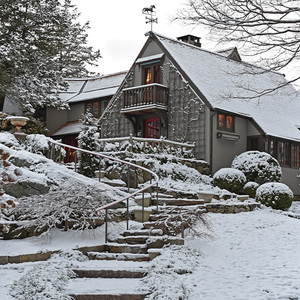waterproof cement paint any good?
Hi all:
I’ve seen a product that could be painted on a concrete basement wall to stop water infiltration. Anyone used this? I was thinking of using this on my basement walls as a vapor barrier prior to putting up insulation so that I don’t trap moisture in the insulation.
Is this a dumb idea?















Replies
Yes it is decent stuff, but no don't use it that way. The oil based Dry-Lok can be used to paint the inside of pools, but then the water pressure is not trying to tear it off of the surface. If you paint the inside walls it will work for a while, but eventually the water pressure from within the wall will cause separation somewhere, and then a leak. If you paint the outside surface of the wall it may work better, keeping the wall itself dry. I wouldn't rely solely on the paint though.
Drats! I was hoping this would work. This stuff is useless then.
Sounds crazy to me Devil Dog. Go here... http://www.buildingscience.com/
Edited 3/24/2006 10:14 pm ET by HandySteve
Hoo-ah, I guess I'll have to go and read those articles after all. Thanks.
This is slightly tangential, but have you thought of your available choices for an insulation material? Obviously, you want to do what you can to stop water infiltration. But with that said, if you avoided fiberglass batts and stuff that absorbs water, a little bit of infiltration from time to time might not present a major problem.
Spray foam might be a good choice. From what I've been told, its use originated in shipbuilding, and some types are pretty immune to water.
Not tangential at all, as it's part of the insulation system. I want to implement the method detaild in FH a few months ago, using rigid foam etc.From that article and what I gathered from here, I understand that the vapor barrier has to go on the cold side of the insulation. I will check into the cost of spray foam. The framer had already built 2x4 walls in place where it will be difficult to put up the rigid foam, hence alternative strategies.
Don't dispair, Drylock is a good product and I have used it several times. Both oil based and the latex. Your problem depends on what type of water you are tying to keep out. If there is a significant amount of pressure you need to address that before doing anything else. On the other hand if you have don't have a significant amount the Drylock will work very well. I would suggest that you use a hard foam type insulation though because of water vapor wicking into the insulation. The hard foam won't have that problem.
Maybe this may make a difference--On the outside of the basement walls, the builder sprayed a gray-ish "water barrier". Don't know what it is, but it smelled like it can cause cancer. So it must be effective...Anyway, I plan on using hard foam--see post above. But do you know what this gray stuff is sprayed on the outside of the concrete? If this works like Drylock, then I am golden. I doubt it since after dry-in, when it had been raining for a while, I could see moisture (dark discoloration) on the concrete. Or is this supposed to happen?
If it rained at night when the air temp was lower, it was probably condensation from higher temperature moist air hitting a cold surface. Every house I have been in during construction was more humid inside than outside if it was still open and the lumber was drying.
"I cut this piece four times and it's still too short."
Don't remember the exact conditions when the rain came down. But your logic is perfectly sound. The architect did specify a type of waterproofing material on the outside...guess I should follow up with the applicator to see what the gray stuff is. When we do get buttoned up, I'll have to watch for the rain and see what the walls look like.
Tufenhundel-
Try this stuff-
http://www.xypex.com/
Works like a charm if you have raw, unpainted block and concrete walls.
jim
Jim:This stuff sounds like the ticket...no environmentally unfriendly ingredients to boot. I'll have to look into this one. Thanks.